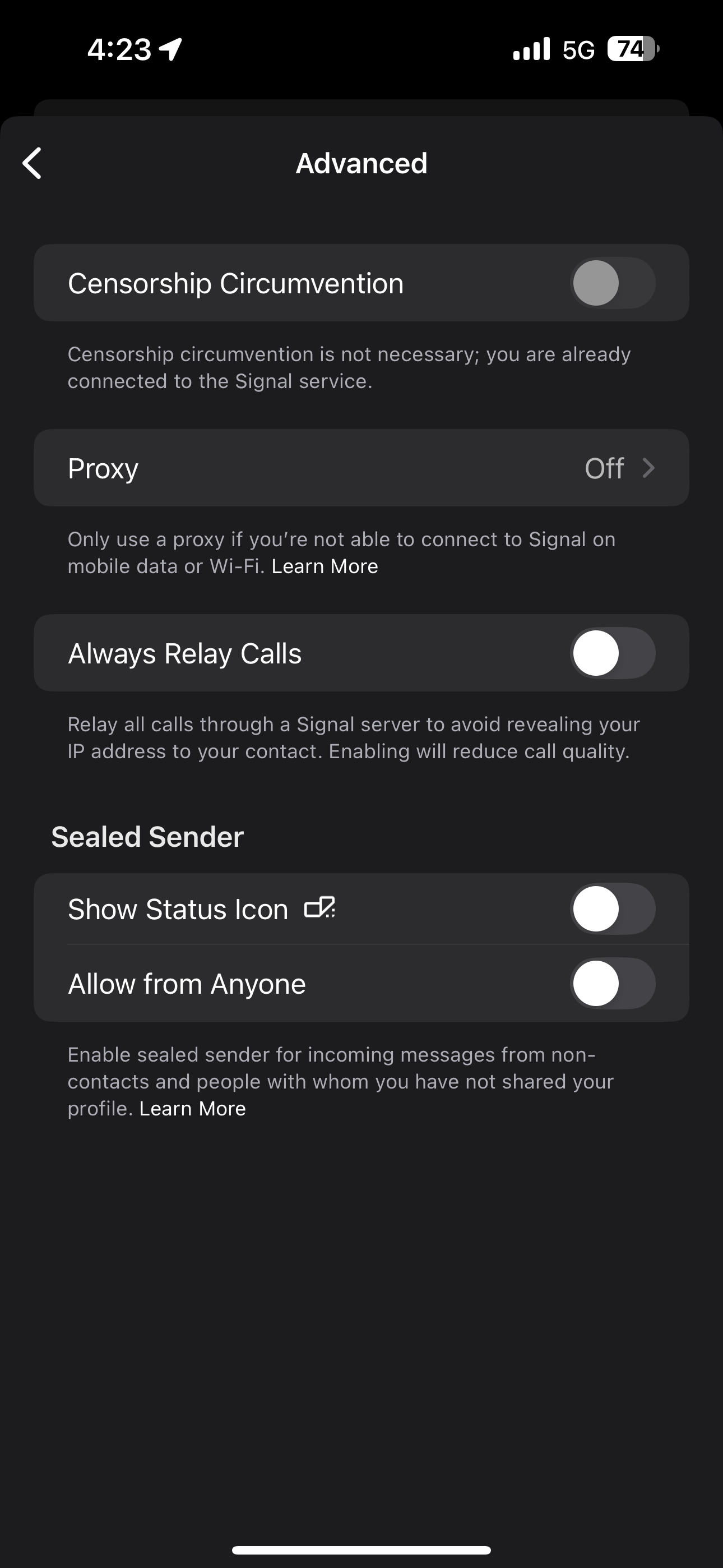

Signal does have a censorship circumvention feature in the advanced settings on iOS which may work when this hits provided you already have the app installed. Never had to use it though.



Signal does have a censorship circumvention feature in the advanced settings on iOS which may work when this hits provided you already have the app installed. Never had to use it though.

And Microsoft ended up providing their own compiled version of OpenJDK to get around the non-commercial use part of the licence to do it.
The everlasting desire to have my own web archive being combatted the the knowledge of just how bad an idea it would be only just keeping it at bay.


I could see it being an issue for more privacy-oriented sites. I imagine some Lemmy and Mastodon users might be less inclined to have to login to Apple, Google or Microsoft to be able to interact with others even if the vast majority of users are fine with it. Would be nice for somebody to come up with an open-source service that handles some more basic age verification so other services can just self-host it instead of each platform implementing their own logins. By basic age verification I mean things like matching user behaviour to users with a known age and maybe some face scanning. Nowhere near perfect and it’s a constant cat and mouse game, but maybe enough to be compliant with the law.
If age verification wasn’t being made mandatory in Australia for social media sites I think it could be a great idea for some services especially if the verification is done by the government with the same level as photo ID. Think dating apps, finance and marketplace sites where having a higher level of confidence that the person you are talking to is who they say they really matters, especially if law enforcement need to be involved down the line. Even if you the user can’t verify the identity of the other person, law enforcement could, and the site might be able to block alt accounts. The credential theft problem still exists of course so it’s no silver bullet, but it’s a lot better than what we have now.


Seeing as these companies would try and dodge accountability for providing these useless products, perhaps we should be including a tax on sunscreen to help pay for the medical treatment costs this will incur on the health system as well as help fund more testing.
Could be a money maker for them. Let the AI slop through, make some money off it for a bit, ban the creator for a violation then delete the video. Far more space efficient than having to deal with real channels that have hundreds of GBs of legacy videos you need to keep around forever and fans who actually care about said creator and legacy. I’m fully expecting the jump where they start producing the slop themselves instead of having to share a percentage with the creators.
It’s not morally good of course. That slop is cancer.


You can work around it in both cases. SecureBoot will only prevent you from running non-signed boot loaders. If that breaks then you just turn off SecureBoot while you work on the issue (assuming SecureBoot failing isn’t due to a compromised boot loader) and the machine will boot normally minus any data stored in the TPM such as the encryption key. For the encryption key, this is something you are supposed to keep a copy of outside the TPM for scenarios like this. On Windows consumer PCs, this is stored in your Microsoft account or the place you specify when enabling it. For Azure or AD-joined PC’s this can be stored in Azure or AD.
The only ways SecureBoot and encryption will burn you are if there is data stored in the TPM that you don’t have a backup of or way of re-creating, or if the encryption headers on the drive are lost. That said, if you aren’t using a TPM some Windows features will break regardless and if the drive is so messed up that the encryption headers are lost then you’re probably back to backups anyway.


As somebody who often ends up using Reddit like Stackoverflow and in some cases needing the Internet Archive (IA) to find the original post after it’s been deleted or garbled, I think this is a wakeup call for those go to Reddit both to get technical help and to post it. More than ever, Reddit is becoming an unreliable place to find answers for old obscure issues and if they are going to lockout places like the IA then I think it’s time people stopped contributing their solutions to Reddit.


For the vast majority of users Linux is just a worse deal. Only thing that really comes to mind that Linux does that users care about is that it will support that hardware that Windows 11 will leave behind, and even those users will happily just run Windows 10 without updates and if that bites them in the ass then maybe they’ll upgrade or just ask their IT friend to use a bypass to make Windows 11 at least work on their old hardware.
Otherwise, of the things users actually care about, Linux has worse app support to the point that even pro-Linux users would rather dual-boot that lose access to their games and worse hardware support. Linux also has a problem of not being well understood by a lot of tech folk so if you bring somebody onboard you better be ready to be their only point of support.
ChromeOS is probably the best example against this since it is basically just a browser, the laptops it sells on are substantially better value than their budget counterparts and realistically a lot of the people buying them are parents for their kids so the user’s preference is substantially pushed aside in favour of cost. The SteamDeck is another good counter-example since it essentially refuses to compete with the PC gaming market by calling itself a handheld.
Linux is stuck in the crappy position of needing more users to get more software and hardware support but users need better software and hardware support for Linux to make sense compared to Windows. It’s getting better and Valve’s efforts have steadily brought the Linux gaming percentage up but it’s still the enthusiast OS.
By all means encourage it’s usage though. Linux is a far more open and privacy-respecting option and the more tech folk and basic-usage users that adopt it the better!


Sounds like this is not the same as S mode but only related to it based on the article. I hope Microsoft kill the cancer that is S mode.


What about second broken web office suite?


Same in Australia. From memory the law has already passed, it’s just got a delay on it to give companies a chance to implement it.


This seems a bit convoluted as an explanation if I’ve understood it correctly. If Telegram as using a compromised hosting provider then you could have the strongest crypto in the world to prevent a man-in-the-middle from seeing the unique identifier for each device and it wouldn’t matter since they already who which user is which IP from the servers they control. They don’t stand to gain anything by exposing the unique string to MiTM attacks when they already control Telegram’s servers unless their goal is also to allow other countries to see which user has which IP too. It just seems like an incompetent implementation.
They seemed pretty well hidden initially despite being purple and heavily contrasting. Wasn’t until I started editing that I noticed.
It’s one of my favourite buildings in Sydney but oh boy does it have issues. I swear they have the scaffolding/footpath cover active most of the time.
The markets were on at the time. :)


Should be much better now. I’ve re-exported all the images in slightly lower quality and it’s drastically reduced the file sizes.


If you only care about having a static IPv6 address take a look at TunnelBroker by Hurricane Electric. They give you free /48 IPv6 blocks tunnelled through their network. Words of warning though: 1) some ISPs block using this service (prevent the tunnel from working), 2) in my experience I’ve seen high latency due to weird routing, 3) those IPs ending up on blocklists due to abuse and 4) the tunnel is unencrypted so traffic between you and Hurricane Electric is trivially intercepted, though if that was a problem in the first place then you wouldn’t be hosting from your home network anyway so this is mostly moot.


IP blocklisting is still very much a thing as well so you can expect any mail originating from a residential IP to be rejected due to their /24 or larger having previously sent spam, and that assumes you can send server-to-server mail (destination port 25/tcp) in the first place since many ISPs and server providers block traffic destined to that port by default to prevent users from getting their IP blocklists. My home ISP blocks outbound SNMP traffic (or at least did 10 years ago) presumably to also prevent abuse. That said, things like blocking inbound port 80/tcp and 443/tcp is purely a measure to prevent people running servers at home which I’m not a fan of.
[REDACTED] deleted